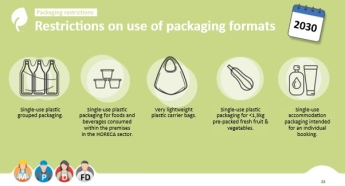PPWR Insights 2 - These plastic packaging types will be banned by 2030: what will be the impact for your business?
The new European Packaging and Packaging Waste Regulation (PPWR) will ban certain packaging formats from 2030. Article 25 and Annex V of the regulation stipulate which single-use plastic packaging may no longer be placed on the market. This article sets out precisely which packaging is involved, the possible exceptions and what this means for your organisation.
What does the law say?
A range of single-use plastic packaging will be banned from 2030. The focus is on packaging that is unnecessary or can be avoided.
Producers and importers will then no longer be allowed to place packaging on the market in the formats and for the applications listed in Annex V of the PPWR.
Member States may retain existing restrictions and allow exceptions in specific cases where there is no viable alternative that ensures food safety or product quality. However, these exceptions are limited and must be properly justified.

Which packaging types will be banned?
1. Single-use plastic grouped packaging at the point of sale
Examples include the film around a six-pack of cans or bottles. This packaging is used to sell multiple products together, but is not necessary for transport or logistics and will therefore be banned from 2030. Only grouped packaging required for logistics purposes will still be permitted. The precise details still have to be worked out by the European Commission in the accompanying guidelines to be published by 12 February 2027 at the latest.
2. Plastic packaging for fresh fruit and vegetables (<1,5 kg)
Single-use plastic packaging for small quantities of unprocessed fruit and vegetables will be banned. These include plastic nets, bags, pots and containers. Exceptions are possible if there is a risk of water loss, oxidation or microbiological hazards, or if it is necessary to separate organic from non-organic products, in accordance with Regulation (EU) 2018/848.
3. Plastic packaging in the hospitality sector for on-site consumption
Cups, plates, trays and other packaging for food and drinks consumed on site in eating areas (including food courts and terraces) may no longer be made of plastic. An exception is made for catering establishments without access to drinking water. Micro-enterprises can continue to use certain packaging subject to conditions where there is no viable alternative or access to reuse infrastructure and if the Member State approves this exception.
4. Individual portion packaging in the hospitality sector
Sauces, coffee creamers, sugar, jams and condiments that are in single-use plastic packaging and are consumed on site, they will soon be a thing of the past. Exceptions include takeaway meals that are eaten immediately or in care facilities where individual portions are required for medical reasons.
5. Packaging for personal care products in hotels
Single-use containers for shampoo, soap, lotion, etc. offered with individual bookings in hotels or other accommodation will be banned. Reusable or refillable alternatives are becoming the norm.
6. Very lightweight plastic carrier bags (<15 micron)
These thin bags are set to disappear except when they are needed to avoid food waste (e.g. for loose fruit), or required for hygiene reasons.
Exceptions and exemptions
The European Commission will publish guidelines providing clarification and giving examples of packaging covered by the restrictions by 12 February 2027. A review of environmental impacts and possible adjustments to the rules will follow in 2032.
What does this mean for your company?
The time to take action is now. Producers, importers and distributors should take a close look at their packaging portfolio and find alternatives that comply with the new rules. Examples include reusable systems, recyclable materials or innovative forms of packaging.
Want to know if your packaging is covered by the bans?
Fost Plus is happy to help you with customised advice, tools and guidance. Contact our Customer Service or your account manager for more information.
